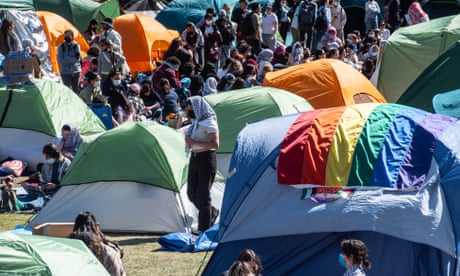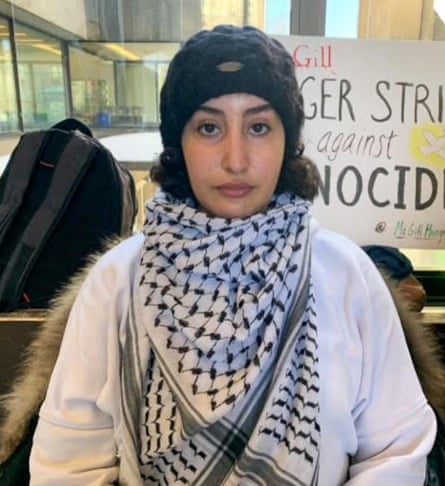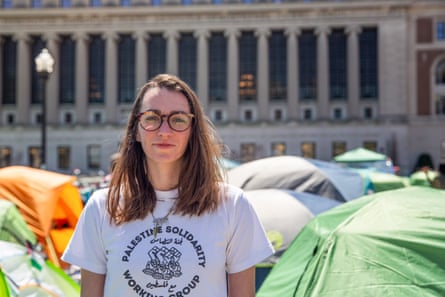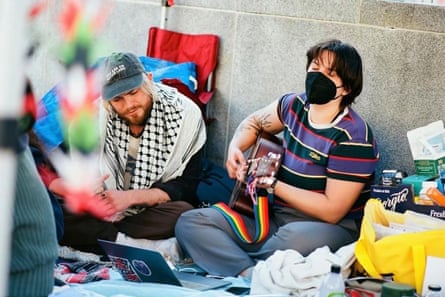Since Israel launched its war on Gaza in October, in response to terrorist attacks by Hamas, students have launched protests, sit-ins and, most recently, encampments, in a wave they hope will encourage universities to divest from companies which have ties to Israel’s military.

Some have been hospitalized due to hunger strikes, others have devoted their lives over the last six months. Dozens of students are waiting to find out whether they will face criminal charges after arrests at Columbia, Brown University, Yale University and elsewhere.
But protesters say the months-long efforts are worth it. They point to US colleges previously responding to student divestment campaigns by selling financial stakes in companies which invested in apartheid-era South Africa, and divesting from companies which did business with the Sudanese government as it took part in a bloody civil war, as evidence that their strategies can work.
Here are the stories of some of the students involved.
Rania Amine

After she went on hunger strike in February, Rania Amine ended up spending six days in hospital. The 25-year-old McGill student, who was born in Morocco, didn’t eat for a total of 34 days: part of a relay system of hunger strikes that is still ongoing at the university.
“I definitely experienced physical symptoms, but it was nothing compared to what we know that people in Gaza are going through every day,” Amine said.
“It’s been a while now that I’ve been out of the hospital. In terms of my physical health, I’ve recovered, there’s nothing that I know of that is problematic. But the mental health toll is very real.”
Since October students at McGill, in Montreal, Canada, have held rallies and protests, calling for the school to divest from companies that supply weapons and other items to Israel’s military. Documents on McGill’s website show that it holds investments in companies including Lockheed Martin, a defense contractor that has sold fighter jets to Israel, and Safran, a French air and defense company.
Amine compared the student protests to anti-apartheid movements on campuses in the 1980s, which led to many universities divesting from companies which operated in South Africa.
“When you see the students rise up, that’s when you know that something has to change, and things will change,” she said.
Ariela Rosenzweig

“I do believe that as a Jewish person, I have a particular responsibility to resist the instrumentalisation of my heritage, and to say that I do not believe that genocide in Gaza or occupation and apartheid in greater Palestine is supportive of my personal safety,” said Ariela Rosenzweig, a 23-year-old student at Brown University in Rhode Island.
Since October, Rosenzweig says she has “basically been a full-time organizer on college campus”. During a recent hunger strike students set up a daily 8am-11pm “occupation” of the main student building on campus, where they hosted Palestinian speakers and had lectures from professors.
“The space was really full every day of people who were honestly and genuinely learning a lot – people who were not the same crew of 100 people who are diehard and had been at everything, but really like the whole university community coming around and really engaging.”
More than 60 students at Brown University have been arrested since October, and in November there was widespread horror after a Brown student, Hisham Awartani, and two friends were shot and injured in Vermont while wearing keffiyehs and speaking in Arabic. Awartani, his friends, and many supporters believe the attack was racially motivated.
“We know that college campuses are really able to speak clearly for the youth of the country, and that the student movement is influential – and it’s influential up until the White House,” Rosenzweig said.
“And so I can say that, like the fact that my life is entirely about this, is 100% worth the urgency of this moment.”
Catherine Elias

“I went to Palestine to teach English in one of the refugee camps when I was 19 years old, over a summer break. And I think that was a really transformational experience for me,” said Catherine Elias, a student at Columbia University who is of Lebanese-Irish heritage.
“It was a radically different perspective to see it firsthand: to witness the checkpoints, to witness the violence, to witness just the pure atrocity that is Palestinians living under occupation every day.”
Elias spent five years living and working in Palestine before moving to New York last year. A member of the Columbia University apartheid divest coalition, she was arrested along with dozens of others at an encampment on college grounds in early April. She was also part of the group that last week set up encampments calling for the university to divest from weapons manufacturers with ties to Israel.
“I think what really led to this moment, to this encampment, is that we have tried every other tactic imaginable to bring the university to be accountable to the democratic will of its student body,” Elias said.
“Columbia has implemented divestment in the past, in the case of the anti-apartheid movement regarding South Africa, as well as divestment from private prisons. So there is precedent for divestment at this university.”
Avery Eddy

After spending a week in the West Bank and four weeks in Israel in 2019, Avery Eddy said they felt compelled to act.
“Seeing the brutal horrors of the apartheid system firsthand absolutely destroyed me, and destroyed my worldview,” Eddy said.
“Walking through Bethlehem, for instance, there being separate walkways and caged channels for Arab people or people with darker color, and having felt the bullet holes in the walls with these children showing me where their families were killed, like: I don’t get to see that and remain silent.”
Eddy, 24, spent eight days on hunger strike as students at Yale appealed for the university to divest from military manufacturers. They suffered dizziness, mood swings and lost 16lb: “But still none of this compares to the half-million people who are experiencing starvation in Gaza. I had a roof over my head, I had access to clean water, and I didn’t have to fear about being bombed, or shot, or forcibly removed from my home.”
At least 47 pro-Palestinian protesters were arrested on Yale’s campus, in Connecticut, on Monday, with the university claiming that hundreds of people had violated “policies and instructions regarding occupying outdoor spaces”.
“I believe the fight for a free Palestine is a fight for the imagination that other worlds are possible, and that injustice should not be accepted,” Eddy said.
source : theguardian
